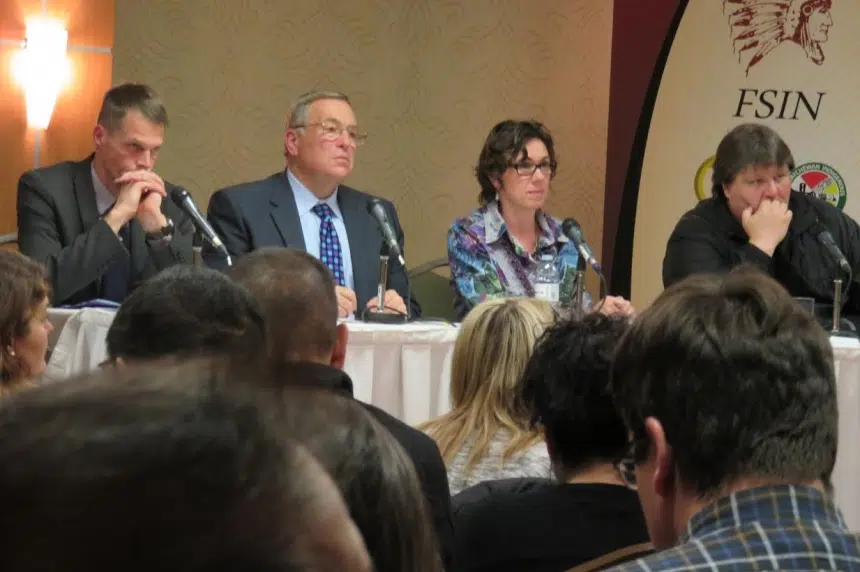Where do Saskatoon’s mayoral candidates stand on increasing PST revenue sharing and reducing indigenous gaming revenues going to the province?
Those were the pointed questions asked by Chief Bobby Cameron Wednesday night at a mayoral forum hosted by the Federation of Sovereign Indigenous Nations at the Travelodge Hotel.
On gaming revenues, Chief Cameron said currently 25 per cent is being taken from SIGA casinos by the provincial government. He asked if candidates would “walk with” the FSIN in lobbying the government to reduce or eliminate that percentage so the money can be invested directly into indigenous communities.
Kelley Moore and Devon Hein agreed to do so.
“I will absolutely walk side-by-side with the indigenous community on all of the matters we’re talking about here,” Moore said.
Charlie Clark and Don Atchison were less committal. They both affirmed they would sit down with FSIN to discuss advocacy, but wouldn’t say if they’d go to the province.
“To say yes today without all the details, I don’t want to tell you something you want to hear,” said Clark. “I want to have a serious conversation and walk side-by-side about how we make sure we make those right investments.”
Atchison echoed Clark, adding he would have to analyze where that spending would go into the future.
SHARING PST REVENUE
The head of the FSIN also asked candidates whether they would direct a proportional amount of PST revenue to the indigenous community. The funds are currently given back to municipalities and cities based on a per-capita formula.
“This city consists of about one-eighth First Nations people,” he said. “Shouldn’t [one-eighth] of the funding go towards First Nation education, housing programs, investment in youth, and other programs?”
Hein was the only candidate to openly commit to providing proportionate revenues to the indigenous community, saying it would help them “determine their own destiny.”
Clark, Atchison and Moore all agreed they would sit down and discuss funding with FSIN if they were elected mayor.
Atchison added municipalities from across Saskatchewan need to come to the negotiating table to ensure everyone was getting their fair share of PST revenues. He said Saskatoon currently isn’t getting a per-capita dollar amount.
Clark noted PST revenues already go towards programs that benefit the indigenous community, including busing and affordable housing.
EDUCATION VS. INCARCERATION
The FSIN forum featured questions asked exclusively by members of the audience.
The first question, posed by FSIN Youth Representative Andre Bear, asked how the candidates would address homelessness and suicide within the inidigenous youth community.
Atchison and Moore both stressed education, safe housing and jobs were key to improving lives.
Clark provided a quote that stuck for the evening in his response, which addressed the incarceration rate among indigenous youth.
“It’s $100,000 a year to keep somebody in jail,” he said. “It’s $20,000 a year to get them through university.”
“We need to make sure our young people are getting the supports to get through school, not going to jail.”
CARDING
The candidates were also asked to clarify their positions on police carding, a practice where officers stop an individual in public and ask for identification. Across North America, the method has been criticized for unfairly focusing on minorities.
Atchison re-affirmed his support for “street checks,” as the police refers to them. He said he didn’t support racial profiling, which he suggested was a different issue altogether.
Clark also repeated his earlier position, saying he didn’t support the practice and police would have to have investigative cause to stop someone.
Moore said she “absolutely” didn’t support carding, adding she’s informed Police Chief Clive Weighill of her position.
“We need to find other ways to police than doing that,” she said.
The statement comes as a clarification to the stance taken during the Broadway Theatre debate last week.
At the time, Moore said she didn’t support carding but had a conversation with the police chief and recognized the need for street checks, but that racial profiling needed to be eliminated from the process.
Hein appeared to decide his position on the issue by polling the audience. He asked how many in the room thought carding was racist. When the majority rose their hands, he simply said “then we won’t do it.”
‘FOOD DESERTS’
Another topic on the minds of those in attendance was access to food. A resident living in Saskatoon’s core commented on the loss of grocery stores in many central neighbourhoods, creating “food deserts” and making it harder for indigenous people to get their weekly supply of food.
Moore and Clark both suggested stores could return if they focused on growing the city inwards and upwards rather than continuing to build new suburbs.
Atchison said they needed to look at incentives for stores, a position Moore agreed with.
The incumbent added he’s been in contact with several chains and has been lobbying for stores to return to what he called “historical” neighbourhoods.
The mayoral candidates will participate in their last major debate on Thursday in CTV Saskatoon’s news studio. The debate will be broadcast live on 650 CKOM at 6 p.m.











